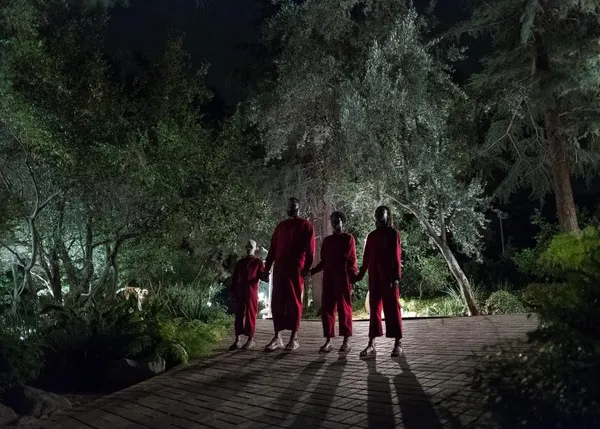Eye For Film >> Movies >> Us (2019) Film Review
Us
Reviewed by: Anton Bitel

The Wilson family - Adelaide (Lupita Nyong'o), her husband Gabe (Winston Duke), and their children Zora (Shahadi Wright Joseph) and Jason (Ewan Alex) - are visiting Santa Cruz for their summer vacation. It is a place where, as a child a little over three decades earlier, Adelaide (Madison Curry) had strayed into a fun fair's hall of mirrors and had an encounter with a double of herself so traumatic that she was rendered mute for weeks afterwards, to the alarm of her parents. Now nervous to be back, Adelaide keeps a panicky eye on her children, and notices signs - strange confluences and coincidences - that things are not right, even if Gabe remains doubtful. That night, however, four figures dressed in red overalls and bearing scissors will come a-visiting the summer house, with malicious intent.
"They're us," Jason observes of these strange intruders. "We're Americans," rasps Adelaide's double Red, who is the only one of these uninvited guests to speak (the others grunt and squeal and howl). Us, the title of Jordan Peele's follow up to Get Out (2017), carefully equivocates between these two identifications, doing double-duty as it plays upon the first-person plural pronoun and the familiar acronym for the United States. The home invaders, whom Red calls "the Tethered", live underground in the shadow of our world, subjugated to us in an unearthly mirroring of our everyday routines and relationships. They are a literal underclass, and if Gabe aspires to have a boat and a car as ostentatious as those of his wealthier friend Josh Tyler (Tim Heidecker), then the Tethered, bestial and aggressive, stunted and cruel, also look up to us and dream of having our better lives for themselves. Tonight, their violent uprising has begun.
After a brief text introduction concerning the networks of underground tunnels that criss-cross America, Peele's film opens in 1986, with little Adelaide watching a television item about the Hand Across America benefit event in which around six million people formed a human chain through the country, raising awareness and money for the nation's hungry and homeless. Alongside the TV we can see a VHS copy of Douglas Cheek's horror film C.H.U.D. (1984) - whose title is an acronym for Cannibalistic Humanoid Underground Dwellers. Both of these will prove programmatic for a film in which a downtrodden, troglodytic subculture will rise from below to claim what is as much theirs as ours, and will make their own national statement about poverty and marginalisation. Make no mistake, Us is self-consciously a horror film, reduplicating elements familiar from home invasion (even, heh, Chris Columbus' Home Alone) and doppelgänger movies (Peele has cited the particular influence of John Brahm's 1960 Mirror Image episode from TV's The Twilight Zone).
Yet at the same time Us comes with a hidden reverse - for it is also an allegory, holding up a mirror to America's socioeonomic divide and painting the boundaries of America's haves and have-nots, them and us, with bloody insurrection. Adelaide will spend much of the film with her hands fettered in chains, an image that evokes both a nation's buried history of slavery and concomitant fears for a retributive redistribution of the wealth and trappings that slavery made possible. As viewers, we are naturally inclined to side with a film's main characters, with those who are humanised, with good family folk like the Wilsons, who are funny and loving and likeable as they strive to live the American Dream, building cosy, bourgeois lives in the sun - but Us is a deeply subversive film, overturning and inverting these conventional values, and repeatedly challenging our sense of allegiance, while questioning the unequal cost of prosperity. Whenever we dine on success, a part of us is paying the bill.
Ultimately, this is the story of a rebellion by those yearning to cut the invisible cords that have always held them back in a mere imitation of life lived fully by their 'superiors' - a struggle for emancipation led by someone uniquely (under)privileged with a clear image of how the other half lives, and longing at last to have a voice. Yes, Us is creepily uncanny, as any decent horror film should be, and at times very funny. Likewise, however, it is difficult and confronting, as its social commentary messes with our sense of identification, reminding us uncomfortably that otherness is just our own repressed - and oppressed - flipside. And with most of the cast members appearing in more than one role, it will leave you seeing double, forced to accommodate contrasting (if symmetrical) perspectives on the gross inequalities of the American way.
Reviewed on: 20 Mar 2019
















